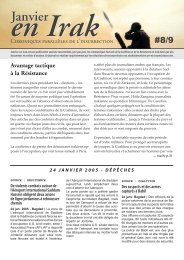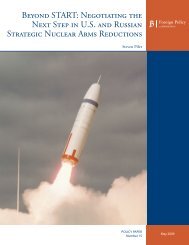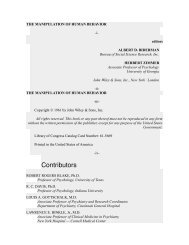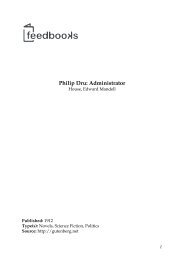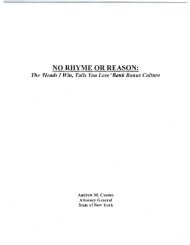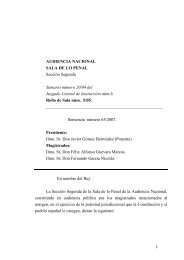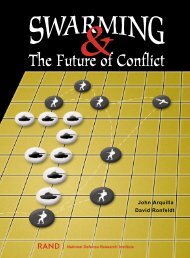Kremlin Allies' Expanding Control of Runet Provokes Only Limited ...
Kremlin Allies' Expanding Control of Runet Provokes Only Limited ...
Kremlin Allies' Expanding Control of Runet Provokes Only Limited ...
- No tags were found...
Create successful ePaper yourself
Turn your PDF publications into a flip-book with our unique Google optimized e-Paper software.
UNCLASSIFIED//FOUOOligarch Mikhail Prokhorov, who is known to cooperate with the <strong>Kremlin</strong>, ownsRosBiznesKonsalting (RBC), which has been quietly gobbling up Russian Internet(<strong>Runet</strong>) domains, holding 21% <strong>of</strong> the <strong>Runet</strong>'s sites, according to its last annual report in2007, including Loveplanet.ru, the second-most popular online dating service in the<strong>Runet</strong>.Pro-Putin Oligarch Vladimir Potanin owns Pr<strong>of</strong>-Media, which owns Rambler.ru, one <strong>of</strong>Russia's largest Internet portals featuring a search engine, an information portal, anInternet rating service, and other web services (Interfax, 9 February). Together, Ramblerand investment firm Finam own Begun, the largest Russian seller <strong>of</strong> context-based ads inthe Russian market. Pr<strong>of</strong>-Media also owns popular Internet news site Lenta.ru.Gazprom-Media, which is controlled by Vladimir Putin's close friend YuriyKovalchuk, a bought RuTube, a popular Russian clone <strong>of</strong> YouTube in March 2008 (RIANovosti, 6 March 2008). Indicating this was part <strong>of</strong> a wider Gazprom-Media initiative,Director Nikolay Senkevich stated his company had allotted $100 million to acquirevarious Internet resources (Kommersant.ru, 9 July 2007). b<strong>Limited</strong> Public OutcryAlthough some independent bloggers and press sources raised concerns at the growinggovernment presence in the Internet, the public is probably unaware <strong>of</strong> the extent to which the<strong>Runet</strong> is owned by <strong>Kremlin</strong> allies. Most buy-outs were not well publicized, appearing only inspecialized business dailies that reported only the fact <strong>of</strong> the deal.Moreover, most Russians are not overly concerned about censorship in general or censorship<strong>of</strong> the Internet. Most actually support censoring the Internet, believing <strong>of</strong>ficial rhetoric statingit would cut down on child pornography, hate speech, or extremism, which may partiallyexplain the lack <strong>of</strong> public reaction to the various <strong>Kremlin</strong> attempts at gaining control <strong>of</strong> theRussian Internet. Those who do react negatively to threats to Internet freedom tend to beopposition members or human rights activists who would be directly affected by censorship.Independent print media are <strong>of</strong>ten subject to political and economic pressure, and selfcensorshipby journalists and editors is common. An Intermedia and Levada Centerpoll carried out in 2008 found that the vast majority <strong>of</strong> the population do not expressconcern about this and do not read these sources. cAccording to a 2008 poll by the <strong>Kremlin</strong>-Influenced All-Russia Center for the Study <strong>of</strong>Public Opinion on Social and Economic Questions (VTsIOM), nearly half <strong>of</strong> allRussians believe that information on the Internet should be regulated. The maina See the 3 December 2008 OSC Media Aid, Putin Ally Kovalchuk Expands Media Empire, Gains Shares inGazprom-Media (CEF20081203317001).b See Appendix A for further information on SUP, DST, RBC, Pr<strong>of</strong>-Media, and Gazprom-Media and theirowners.c See the 24 June 2008 OSC Intermedia Report, Media Survey Report: Russia 3477/08(GMP20080624411001).This OSC product is based exclusively on the content and behavior <strong>of</strong> selected media and has not been coordinated with otherUS Government components.UNCLASSIFIED//FOUO2
UNCLASSIFIED//FOUOargument given for this view was that the Internet is filled with "dirt" and "trash" andthat it is accessible to children and has a bad influence on them. When asked whatshould be censored, the majority <strong>of</strong> respondents named child pornography (89%),followed by 83% in favor <strong>of</strong> blocking terrorist organizations and extremist content.Many (41%) believed that the sites <strong>of</strong> political opposition movements should beblocked (9 December 2008).Regardless <strong>of</strong> their stance on censorship, according to Gazeta.ru, Russians are notlikely to change their social networking use over privacy concerns. The director <strong>of</strong>marketing and sales at Rambler Media, Anton Terkhov, stated that "discussions havecome up in the <strong>Runet</strong> that data from social networks are being used by governmentstructures, but these conversations have not led to users closing their accounts. Quitethe opposite, the popularity <strong>of</strong> the services has continued to grow." The head editor <strong>of</strong>Yandex, Yelena Kolmanovskaya, had a similar opinion stating: "Talk <strong>of</strong> the possibledecline in popularity <strong>of</strong> these services is doubtful" (26 March 2009).Protests Over BuyoutsThere have been limited protests over the buyouts, but reaction centered on well-publicizeddeals involving major Internet outlets and known <strong>Kremlin</strong> supporters and appeared mainly inopposition publications and politically active bloggers' journals.In March 2008, Gazprom-Media purchased the popular Russian clone <strong>of</strong> YouTube,video-sharing platform RuTube. This prompted Oleg Kozyrev, a well-knownopposition blogger, and Oleg Salmanov, a reporter for the online opposition paper TheNew Times, to protest: "The Russian Internet community is following with alarm thesocial networks passing under the control <strong>of</strong> those who are loyal to the authorities andresponsive to their requests. Many still remember what the federal media were likebefore Vladimir Putin arrived in the <strong>Kremlin</strong>. Yes, the purchase by state corporations(or by businessmen close to the <strong>Kremlin</strong>) <strong>of</strong> large media does not always and notnecessarily lead to them stopping being objective. But the authorities gain thelegitimate opportunity 'to switch <strong>of</strong>f the button' in case <strong>of</strong> something. The networksonly have to be in the necessary hands" (17 March 2008).Usmanov's June 2008 purchase <strong>of</strong> 50% <strong>of</strong> LiveJournal from SUP prompted speculationabout censorship, but also criticism <strong>of</strong> SUP's management <strong>of</strong> the resource. Cyxymu, d ablogger and pr<strong>of</strong>essor in Tbilisi, Georgia, expressed fears that this was part <strong>of</strong> a plan bythe authorities to rein in freedom <strong>of</strong> speech on the Internet: "That means everythingwill be under the control <strong>of</strong> the FSB [Federal Security Service]. Or more accuratelyunder greater control than earlier" (22 June 2008).d Cyxymu was later the victim <strong>of</strong> a politically motivated denial-<strong>of</strong>-service (DDOS) attack that brought downFacebook, Twitter, and LiveJournal over his comments on the Georgia-Russia war in August 2008.This OSC product is based exclusively on the content and behavior <strong>of</strong> selected media and has not been coordinated with otherUS Government components.UNCLASSIFIED//FOUO3
UNCLASSIFIED//FOUOIn September 2009, Yandex e owners gave a "golden share" to government-ownedSberbank, giving the bank the right to veto any sale <strong>of</strong> more than 25% <strong>of</strong> Yandex andensuring this sensitive resource remains in government-friendly hands (RussianNewsweek, 17 August 2009). In response, The Moscow Times, an English-languagedaily owned by Finnish company International Media, wrote: "While Yandex'sconcessions have been minor and apparently voluntary, Internet users fear that theycould lead to restrictions like those in China, where access to pro-democracy andforeign news websites is severely limited" (26 November 2009).In December 2009, various media reported that DST was negotiating to buy ICQ fromAOL in a deal that would give DST control <strong>of</strong> roughly half <strong>of</strong> the Russian messagingmarket (Lenta.ru, 15 December 2009). f Blogger response centered on having to payfor the previously free service instead <strong>of</strong> any risk <strong>of</strong> monitoring or censorship. BloggerAleks Eksler (exler) stated: "If DST buys ICQ, we'll have to leave this platform forgood because, just like 'Zhadnoklassniki' [greedyclassmates] it's easy to predict whatwill happen. First they'll forbid any alternative clients so that Internet chatters willhave to use the <strong>of</strong>ficial client where they can put ads everywhere. Then they'll start themonetization <strong>of</strong> the service." Others responded with alternative chat platforms anddebated whether or not ICQ would cease to be free (15 December 2009).Protests Over Government MovesOfficials have made numerous attempts to pass laws seeking to regulate the Internet. Theyhave also been accused <strong>of</strong> using laws covering the mass media or extremism to censor the<strong>Runet</strong>. Such methods have met with significant resistance from the opposition and humanrights activists, and the government has scaled back or rejected some provisions <strong>of</strong> thecontroversial laws.The Joint Commission on National Policy and Cooperation <strong>of</strong> Governments and ReligiousUnions <strong>of</strong> the Federation Council announced a bill with planned amendments to the law onmass media on 11 February 2008. If passed in its original form, the amendments would havegiven any electronic media which has more than 1,000 hits per day the status <strong>of</strong> mass media,thus making them subject to laws on mass media such as the law on extremism. Amidcontroversy and outcry provoked by news <strong>of</strong> the draft, supporters <strong>of</strong> the bill attempted toassuage fears that it would lead to censorship, promising that the law would not affect sites thatare "not information sources."e Yandex is the number one site in the Alexa.com top 100 Russian sites and Russia's most popular search engine.In addition to its search engine function, Yandex is an important information source, providing a top news itemsummary and, prior to December 2009, a list <strong>of</strong> the top stories in the blogosphere, which many saw as a way topublicize grievances. See Appendix A for more information on Yandex.f ICQ is one <strong>of</strong> the most popular instant messaging services in the East European and Russian markets. PopularInternet news site Lenta.ru quoted Comscore estimates <strong>of</strong> ICQ's user base in Russia at 8.4 million users and 12.6million in Germany (15 December). According to potok.in.ua, experts from the Internet Association <strong>of</strong> Ukraineestimate that ICQ is installed on 80% <strong>of</strong> computers in Ukraine. DST's Mail.ru has its own messaging service,Mail.ru Agent, which has 12 million estimated users and is currently the most popular messaging service inRussia.This OSC product is based exclusively on the content and behavior <strong>of</strong> selected media and has not been coordinated with otherUS Government components.UNCLASSIFIED//FOUO4
UNCLASSIFIED//FOUOBloggers expressed varying degrees <strong>of</strong> alarm over the potential danger the law wouldpose to their community, because so many <strong>of</strong> their blogs receive more than 1,000 hitsper day. Blogger may-antiwar wrote: "As soon as a site becomes mass media, we willbe threatened not only with immediate shutdown but also unpleasant personal sanctionsunder the law 'On extremism' and we will become political prisoners. They havedeclared war on our resource" ( 27 February 2008). Blogger Viking_nord called theinitiative "extremely stupid" and claimed that "over the last five years there were 20such initiatives and no one ever passed one <strong>of</strong> them" (11 February 2008).Independent Internet sites, like bloggers, expressed their concern that the law wouldlead to the closure <strong>of</strong> Internet resources and ridiculed the 1,000 hits-per-day figure(Newsru.com, 12 February 2008; Strana.ru, 11 February 2008).On 11 February, Vladimir Slutsker, the deputy chairperson <strong>of</strong> the commission, gave avery broad definition <strong>of</strong> sites to be covered: "Any regularly updated Internet site canbe included in the understanding <strong>of</strong> mass media, including personal diaries, variousforums, and chats including, for example, dating sites" (Gzt.ru, 11 February). Howeveron 12 February, he backed <strong>of</strong>f, stating: "The amendments to the law 'On the MassMedia,' which were discussed today by the Internet community, only concern siteswhich are, in fact, Internet mass media although they are not registered at themoment...The blogosphere, dating sites, and search engines will not fall under that lawbecause they are not mass media" (SMI.ru).Protest Over Court CaseA 7 July 2008 trial convicting Savva Terentyev on charges <strong>of</strong> extremism, the first criminalprosecution in Russia for comments posted in a blog, prompted warnings that the legal systemwould be used to target bloggers critical <strong>of</strong> local or federal authorities. Terentyev, whoadmitted authorship <strong>of</strong> the comment but pleaded not guilty to charges <strong>of</strong> extremism, received asuspended one-year prison sentence under Article 282 <strong>of</strong> the Criminal Code <strong>of</strong> the RussianFederation -- inciting hatred or enmity (ITAR-TASS, 7 July 2008; Interfax, 14 July 2008). Inhis comment, he railed against the police, describing them as "filth" and saying that a "corruptcop should be ceremonially burnt daily" in the central square <strong>of</strong> every city.Political columnist Valeriy Vyzhutovich claimed that the Terentyev "show trial" was a"test run" to gauge how Russian society would react to the future imposition <strong>of</strong>restrictions on freedom <strong>of</strong> speech on the Internet (Politkom.ru, 25 April 2008). Terentyev's lawyer, Vladislav Kosnyrev, warned that now under Article 282"practically any statement can, if desired, be a pretext for criminal prosecution."Suranov added that "LiveJournal users need to know: The more you show interest inpublic life, then the greater the interest the law enforcement agencies will have in you"(The New Times, 14 July 2008).Terentyev was not pardoned, but in a subsequent trial a 29-year-old senior teacher atthe Kuzbass State Technical University, Dmitriy Solovyev, who was accused <strong>of</strong>inciting hatred and hostility against a social group for his negative statements againstFSB and MVD [Interior Ministry] employees in entries on his LiveJournal page wasnot found guilty (Forum.msk, 13 January).This OSC product is based exclusively on the content and behavior <strong>of</strong> selected media and has not been coordinated with otherUS Government components.UNCLASSIFIED//FOUO5
UNCLASSIFIED//FOUOInternet users have taken to creating lists <strong>of</strong> bots that spam their blogs. Orly74 recommendedbanning a list <strong>of</strong> 40 users from opposition journals in connection with attacks on other oppositionjournals (16 October 2009). Out <strong>of</strong> frustration with what he said was LiveJournal's lack <strong>of</strong> will tostop bots, Andrey Malgin (avmalgin), writer and <strong>Kremlin</strong> critic and well-known blogger, starteda list <strong>of</strong> bots and gave users instructions on how to ban them. Readers added to the list incomments and sympathized with his frustrations (30 January 2008). Oleg Kozyrev started a list<strong>of</strong> bots to ban on 9 October 2008. User Botolov's entire blog is devoted to stopping bots. Hemaintains a list <strong>of</strong> bots updated nearly daily by other users and helps to ban them. k l mOpposition users are also savvy at circumventing the <strong>Kremlin</strong>'s monitoring and censorshipefforts. In an interview with Global Voices Online, a project <strong>of</strong> the Berkman Center thattranslates blogs from around the world, Roman Dobrokhotov, the leader <strong>of</strong> a democraticRussian youth movement "We" (My), stated: "All our activities are conducted via the Internet.The main mechanism that creates and maintains our movement is a Google group. Weconsider it relatively secure. We use an encrypted connection. We only add people that weknow…. In addition to Google groups, we use Twitter. But we do it during our real-lifeactions, not before. When you deal with an opposition movement it is important that yourfriends can always follow you in case something bad happens." He continued: "Theauthorities have a legal right to ask for any information from Internet providers. They haveaccess to everything we send through SORM 2 system. n But our information is encrypted andit will take a lot <strong>of</strong> time for them to decode it. The authorities can also create Internet filters orjust shut down blogging services like LiveJournal. But we can always work through otherplatforms. We can also use anonymizers and other tools like proxy services"(Globalvoicesonline.org, 20 December 2009).Suspicions Over New DomainAlthough the . domain (Cyrillic language domain) is touted as being aimed at making theInternet more accessible to more Russians, some bloggers and press sources have pointed outthat it may serve to isolate Russian Internet users from the rest <strong>of</strong> the World Wide Web,forming a kind <strong>of</strong> "cyber ghetto."In an interview with Rosbalt news agency, Ilya Ponomarev, an avid blogger andmember <strong>of</strong> the Duma Committee on Information Technology and Communications,called the new domain "a step towards the isolation <strong>of</strong> the Russian segment <strong>of</strong> theInternet from the international Internet space" and stated that it was "a harmful andwrong course" (ilya-ponomarev; Rosbalt, 25 November 2009). One commentator toPonomarev's Rosbalt interview debated Ponomarev, stating that the new domain was apositive step because it would make the Internet accessible to people who do not knowk Refer to avmalgin.livejournal.com/1134347.html.l Refer to oleg-kozyrev.livejournal.com/1544746.html?thread=15340586.m Refer to botolov.livejournal.com/.n SORM is a technical system for search and surveillance in the Internet. According to some reports, underSORM-2 Russian Internet service providers (ISPs) must install a special device on their servers to allow the FSBto track all credit card transactions, e-mail messages and web use.This OSC product is based exclusively on the content and behavior <strong>of</strong> selected media and has not been coordinated with otherUS Government components.UNCLASSIFIED//FOUO7
UNCLASSIFIED//FOUOLatin characters and that people who wanted to speak with foreigners would still haveLatin domains to use, according to blogger diles<strong>of</strong>t (ilya-ponomarev, 25 November).User illka worried that sites on the Cyrillic domain would be subject to a great deal <strong>of</strong>pressure and unable to change their registrar to another provider and that once peoplebecame used to domain names in Russian, they would not be willing to go to "that[Latin character domain] Internet" because there would be "nothing comprehensiblewritten there" (ilya-ponomarev, 25 November).Another blogger, di09en, researched the newly registered . (blog.rf) domain andclaimed that it was registered in the name <strong>of</strong> the "Special Communications andInformation Service <strong>of</strong> the Federal Guard Service <strong>of</strong> the Russian Federation."Commentators stated that it was actually the Federal Protective Service <strong>of</strong> Russia, adepartment <strong>of</strong> the Federal Agency <strong>of</strong> Government Communications and Information(FAPSI) (ilya-ponomarev, 25 November).ImplicationsThe Russian Government does not need to own the <strong>Runet</strong> in order to monitor or control it. Ithas numerous laws and policies in place that allow it to limit or threaten open discussion on theInternet. Portals owned by <strong>Kremlin</strong> allies do not yet exhibit signs <strong>of</strong> censorship, but theiracquisitions provide <strong>of</strong>ficials an additional lever to control the content <strong>of</strong> the <strong>Runet</strong> if the<strong>Kremlin</strong> feels threatened. The <strong>Kremlin</strong> is also developing the ability to shape the onlinediscourse using such organizations as the <strong>Kremlin</strong> School <strong>of</strong> Bloggers and its various youthgroups.Moreover, many Russians actually favor some degree <strong>of</strong> censorship <strong>of</strong> the <strong>Runet</strong> and anypublic protest against government control would therefore most likely come from the largelydistrusted and marginalized opposition. The lack <strong>of</strong> public concern over the loss <strong>of</strong> yet anotherindependent source <strong>of</strong> information could lead to even greater state control <strong>of</strong> information andits citizens' beliefs.Still, information may seep through any <strong>Kremlin</strong> efforts to censor the Internet as non-Russianportals such as Google, YouTube and Wikipedia are gaining popularity, o and opposition usersare very savvy in regard to circumventing censorship efforts.o According to Alexa.com rankings <strong>of</strong> the top sites in the Russian Internet in May 2009 and February 2010,Google has moved from fifth position to fourth. YouTube remains in eighth position and Wikipedia just brokeinto the top 10 at ninth.This OSC product is based exclusively on the content and behavior <strong>of</strong> selected media and has not been coordinated with otherUS Government components.UNCLASSIFIED//FOUO8
UNCLASSIFIED//FOUOAppendix ASUPSUP is an Internet media investment company founded in the summer <strong>of</strong> 2006 by Russianbillionaire Aleksandr Mamut and US media entrepreneur Andrew Paulson. It expandedaggressively in the new media sector, buying up a sports website and Internet ad agenciesbefore buying LiveJournal in December 2007 in a deal estimated at $30 to $100 million(Russia Today, 4 December 2007). SUP leadership included Anton Nosik, one <strong>of</strong> the pioneersin Russian website development and a famous blogger. p As <strong>of</strong> 1 September 2009, SUP ownedGazeta.ru, LiveJournal.ru, and Championat.ru (Kommersant).Mamut is a longtime prominent Russian banker who developed close ties to the family <strong>of</strong>President Boris Yeltsin and top <strong>of</strong>ficials <strong>of</strong> his Presidential Administration and also top<strong>of</strong>ficials <strong>of</strong> President Putin's administration. This prompted many expressions <strong>of</strong> concernamong bloggers and other observers that his purchase <strong>of</strong> LiveJournal would increase <strong>Kremlin</strong>influence over the blogging platform. qDigital Sky Technologies (DST)Yuriy Milner and Grigoriy Finger formed DST in 2005 with their own money and funds fromoutside investors, which now include Goldman Sachs and Alisher Usmanov. While DSTcontinues to be controlled by the two founders, Usmanov now owns 35% <strong>of</strong> the company,making him the single-largest shareholder.DST is a dominant force in the <strong>Runet</strong>, owning the most popular websites in the CIS, includingRussia, Ukraine, Kazakhstan, Georgia, and Armenia, and estimates that over 70% <strong>of</strong> all pageviews in the Russian-language Internet are on its companies' websites (Dst-global.com, 2February). In Russia, DST owns a significant stake in VKontakte, a Facebook clone and thelargest social network site in Russia, and a controlling interest in Forticom group, the owner <strong>of</strong>Odnoklassniki.ru, a very popular Russian clone <strong>of</strong> Classmates.com and third-most popularsocial network in Russia. DST owns more than half <strong>of</strong> the second-most popular site overall,Mail.ru, which <strong>of</strong>fers a variety <strong>of</strong> services including news, e-mail, a search engine, directories,chats, job services, blogs, role-playing games, and messaging. Mail.ru also controls severalother important Internet projects. Because <strong>of</strong> the prevalence <strong>of</strong> the <strong>Runet</strong> in the former Sovietspace, these sites are also the most popular sites in Uzbekistan, Kazakhstan, Ukraine, andMoldova. Outside <strong>of</strong> Russia, DST owns Seznam.cz, a Czech social networking site; a majorityshare in Nasza-klasa.pl, a Polish clone <strong>of</strong> Classmates.com, and a significant stake in Estonianjobs portal CV Keksus, the number two site in Estonia, based on a Gemius research reportfrom January 2009. The company's 75% interest in Forticom also gives it control <strong>of</strong> some <strong>of</strong>the top portals in Lithuania, Latvia, and Estonia -- One.lt, One.lv, and One.ee.Usmanov is the single-largest stakeholder <strong>of</strong> DST (Russkiy Newsweek, 17 August 2009).According to Finam expert Leonid Delitsyn, "Alisher Usmanov is not an investor for whomp See the 29 May 2008 OSC Analysis, Takeover <strong>of</strong> Major Blog Platform Prompts Censorship Fears(CEF20080529511001).q See the 29 May 2008 OSC Analysis Takeover <strong>of</strong> Major Blog Platform Prompts Censorship Fears(CEF20080529511001).This OSC product is based exclusively on the content and behavior <strong>of</strong> selected media and has not been coordinated with otherUS Government components.UNCLASSIFIED//FOUO9
UNCLASSIFIED//FOUOstate interests are an alien concept… When his structures acquire a media asset this is seen as adeal that has been done with the state's approval" (Infox.ru, 3 July, 2009). According toRusskiy Newsweek, the Russian version <strong>of</strong> international news magazine Newsweek, the Internetcommunity views Usmanov as "an outright government surrogate" (17 August 2009).Usmanov is considered especially close to President Medvedev. For a long time he was a top<strong>of</strong>ficial <strong>of</strong> Gazprom where Medvedev was chairman.Usmanov has been building a media empire since August 2006, buying the respected businessdaily Kommersant, the antigovernment website Gazeta.ru, and sports channel 7TV in late2006. He announced on 7 November 2006 in Vedomosti that he intended to create amultimedia holding company <strong>of</strong> TV channels, newspapers, radio stations, and websites andtold Vremya Novostey he aimed to create a media empire like Bloomberg's (28 December2006). Usmanov has ambitious aims, specifically in the social networking sphere. Forexample, he launched the NewTube.ru video site in June 2008 to challenge Gazprom-Media'sRuTube (Kommersant, 3 June 2008). In addition, in 2008, he attempted to buy 10% <strong>of</strong> Yandexin a deal that later failed (Lenta.ru, 28 May 2009).DST Company President Yuriy Milner was also recently appointed to the PresidentialCommission for the Modernization and Technological Development <strong>of</strong> the Russian Economy,whose mission is the "reduction <strong>of</strong> the Russian economy's dependence on world economicconditions and the development <strong>of</strong> high technology" (Politkom.ru, 25 May 2009).RosBiznesKonsalting (RBC)RosBiznesKonsalting was created in 1992 and is an Internet-holding company. RBC owns,among others, news portals Rbk.ru, Utro.ru, and Cnews.ru. It also owns Loveplanet.ru, thesecond-largest dating service in Russia, Quiet Internet Pager, a free instant messenger, andFishki.net, a top humor and entertainment website.Prokhorov has a history <strong>of</strong> cooperating or supporting government initiatives. For example, hecame out in favor <strong>of</strong> businesses paying their full taxes, a rarity in Russia, and registeredhimself as living in Yeruda in the Krasnoyarsk region, where his mining company Polyus Goldis located, in order to support the region with his taxes. A spokesman for Prokhorov'sinvestment vehicle Onexim explained: "Given the difficult economic period, one <strong>of</strong> the mainsocial responsibilities <strong>of</strong> a business is to pay its taxes in full, and it would seem proper to paythem where the main sources <strong>of</strong> income are " (RIA Novosti, 22 May 2009).Pr<strong>of</strong>-MediaOne <strong>of</strong> Russia's largest media conglomerates, Vladimir Potanin's Pr<strong>of</strong>-Media was created bythe oligarch's Oneksimbank in late 1997 to run Russkiy Telegraf, Izvestiya, KomsomolskayaPravda, and other papers. In March 2003, Pr<strong>of</strong>-Media purchased 35% <strong>of</strong> the Dutch-ownedIndependent Media publishing house which owned The Moscow Times and Vedomosti. r Pr<strong>of</strong>-Media later changed its strategy, selling <strong>of</strong>f its print media, especially political newspapers,and buying up entertainment television channels and Internet sites. sr See the 17 March 2003 FBIS Media Aid, Potanin Expands Media Empire (CEP20030317000187).s See the 13 November 2006 OSC Analysis, Potanin, Other Russian Oligarchs Building New Media Empires(CEF2006110931700).This OSC product is based exclusively on the content and behavior <strong>of</strong> selected media and has not been coordinated with otherUS Government components.UNCLASSIFIED//FOUO10
UNCLASSIFIED//FOUOPotanin purchased Rambler.ru in November 2006, which, along with his news websitesLenta.ru and Afisha.ru, figures in the top 100 <strong>Runet</strong> sites. Pr<strong>of</strong>-Media and investmentcompany Finam own Begun, the leading Russian company in context-based ads. According tonumerous sources, advertising is the most important source <strong>of</strong> revenue to websites, making up,for example, 80% <strong>of</strong> the revenue <strong>of</strong> Yandex (Vedomosti, 30 December 2009). Consistent withthe government's policy <strong>of</strong> keeping important companies in Russian hands, the Federal AntimonopolyService recently blocked an attempt by Google to buy Begun, citing inaccuracies inthe paperwork. Some analysts believe the decision was actually motivated by concern atlosing control over a Russian market leader (Vedomosti, 24 September 2009). Informativebusiness daily Kommersant's sources in the market said the deal was not approved "becausethe government came out against the sale <strong>of</strong> Begun to the American Google Inc" (9 April2009).Despite rocky relations with the <strong>Kremlin</strong> at the start <strong>of</strong> Vladimir Putin's presidency, Potanin isnow believed to have a good relationship with Putin and the government. Rafael Akopov, thepresident <strong>of</strong> Pr<strong>of</strong>-Media, supported the government's right to deem Internet portals "strategic" tand to determine policy on them. He stated: "The Internet is a strategic sector and thegovernment has every right to determine policies in it" (Vedomosti, 9 April 2008).Gazprom MediaGazprom-Media was set up by Russia's gas monopoly Gazprom to manage its media holdings,including the popular national TV channel NTV and Ekho Moskvy radio, and has become one<strong>of</strong> Russia's biggest media conglomerates. Its parent company, Gazprom is partially owned bythe Russian Government.Yuriy Kovalchuk, a longtime Putin friend with ties to Medvedev, controls Gazprom-Media. uYandexYandex is partially owned by Ru-Net Holdings, which was founded by Baring Vostok CapitalPartners and the Moscow investment company United Financial Group. Leonid Boguslavskyowns 50% <strong>of</strong> Ru-Net Holdings and has served as its Chairman and CEO since April 2001. Ru-Net Holdings owns 35% <strong>of</strong> Yandex, which is currently the top-ranked website in Russia and itsdominant search engine. Yandex's director, Arkadiy Volozh, controls 30% <strong>of</strong> the company andthe remainder <strong>of</strong> Yandex is owned by Yandex's managers and several other investmentcompanies including Baring Vostok Capital Partners and Tiger Global (Bfm.ru, 11 September2009). Yandex owns popular portals Narod.ru and Moi Krug, a business portal similar toLinkedIn. Ru-Net holdings also owns 50% <strong>of</strong> largest Internet store, Ozon.ru (Kommersant, 1September 2009).t Although they failed to pass, in spring 2008, the government debated amendments to the law "On the Procedure<strong>of</strong> Foreign Investment in Companies and Organizations Having Strategic Importance for National Security." Thechanges would have added the Internet to the list <strong>of</strong> strategically important sectors <strong>of</strong> the Russian economy,thereby limiting foreign ownership (Gazeta.ru, 5 March 2008).u Kovalchuk was Putin's partner in creating a dacha co-op in the 1990's. See the 26 April 2007 OSC Analysis,Close Putin Associate Kovalchuk Takes <strong>Control</strong> <strong>of</strong> Two National TV Channels (CEF20070426317001).This OSC product is based exclusively on the content and behavior <strong>of</strong> selected media and has not been coordinated with otherUS Government components.UNCLASSIFIED//FOUO11
UNCLASSIFIED//FOUOIn September 2009, Yandex owners gave a "golden share" in the company to Sberbank. Thisspecial share, which cannot be sold without the approval <strong>of</strong> Yandex's board <strong>of</strong> directors, givesSberbank the right to veto any sale <strong>of</strong> more than 25% <strong>of</strong> Yandex, thus ensuring this sensitiveresource remains in government-friendly hands (Russkiy Newsweek, 17 August 2009). Anunnamed source <strong>of</strong> the respected business daily Vedomosti in the federal government stated:"Yandex is an infrastructural company and the government is not indifferent as to who controlsit. Sberbank will become the de facto representative <strong>of</strong> the government and will be able toprevent the transfer <strong>of</strong> Yandex to the control <strong>of</strong> foreigners" (24 September).Arkadiy Volozh, owner and director <strong>of</strong> Yandex stated: "We cannot fail to take thegovernment's position into account and believe it is necessary to develop a legal mechanismthat will consider national interest when making large deals involving Yandex" (Interfax, 24September 2009).This OSC product is based exclusively on the content and behavior <strong>of</strong> selected media and has not been coordinated with otherUS Government components.UNCLASSIFIED//FOUO12
UNCLASSIFIED//FOUOAppendix B: Alexa Top 100 from 2 February, 2010 (Portals Owned by <strong>Kremlin</strong>-friendlyBusinesses Highlighted)1. Yandex (Ru-Net Holdings)2. V Kontakte (DST)3. Mail.ru (DST)4. Google5. Odnoklassniki (DST viaForticom)6. Google.com7. Rambler (Pr<strong>of</strong>-Media)8. 8 YouTube9. Wikipedia10. Vk.com (DST)11. LiveJournal (SUP,Usmanov)12. Narod.ru (Yandex)13. Torrents.ru (unknown)14. uCoz (Unknown)15. LiveInternet.ru (GermanKlimenko; some reports sayDST bought an interest. Notconfirmed.)16. Ya.ru (Yandex)17. Yahoo18. Depositfiles.com19. Letitbit.net20. Blogger.comThis OSC product is based exclusively on the content and behavior <strong>of</strong> selected media and has not been coordinated with otherUS Government components.UNCLASSIFIED//FOUO13
UNCLASSIFIED//FOUO21. Radikal-Foto (AntonPopkov)22. Rosbizneskonsalting(RBC)23. AdvMaker.ru (unknown)24. Gismeteo.ru (unknown)25. KinoPoisk.ru (Allocine)26. Facebook (5% DST)27. MarketGid (Finam)28. Quiet Internet Pager(RBC)29. Automobili v Rossii(Mikhail Rogalskiy)30. Zaycev.net (unknown)31. Micros<strong>of</strong>t Corporation32. Novoteka.ru (Finam)33. Lenta.ru (Pr<strong>of</strong>-Media)34. RapidShare35. Micros<strong>of</strong>t Network36. PartyPoker.com37. RossiyskoyeInformattsionnoyeAgentstvo (VTGRK)38. iFolder.ru (Agava)39. Diary.ru (Kubik)40. Yandex.net (Yandex)This OSC product is based exclusively on the content and behavior <strong>of</strong> selected media and has not been coordinated with otherUS Government components.UNCLASSIFIED//FOUO14
UNCLASSIFIED//FOUO41. RuTube (GazpromMedia)42. Tfile.ru (unknown)43. Ozon (Ru-Net Holdings)44. ICQ (AOL currently ownsbut reportedly in talks tosell to DST or Yandex)45. LiveJasmin.com46. Headhunter (DST)47. Double Click48. Twitter49. Komsomolskaya Pravda(Grigoriy Berezkin YESN)50. Sape.ru (DST)51. Gazeta.ru (SUP)52. Fishki.net (RBC)53. Ask.com54. Avito.ru (Kontact EastHolding)55. Urldirecting.com56. Chempionat.ru (SUP)57. Kinozal.tv (unknown)58. Afisha.ru (Pr<strong>of</strong>-Media)59. Promoisland.net60. Biblioteka MaksimaMoshkova (MaksimMoshkov)This OSC product is based exclusively on the content and behavior <strong>of</strong> selected media and has not been coordinated with otherUS Government components.UNCLASSIFIED//FOUO15
UNCLASSIFIED//FOUO61. Iz Ruk v Ruki (ProntoMoskva)62. Torrentin.ru (unknown)63. Sport-Ekspress (IvanRubin)64. Pornolab.ru (unknown)65. Molotok.ru (DST)66. Super Dzhob (AlekseyZakharov)67. Mamba.ru (Mail.ru,Finam)68. Rabota.ru (RDV Media)69. 1e100.net (Google)70. eBay71. Loveplanet.ru (RBC)72. Ekho Moskvy (GazpromMedia)73. Vesti (VGTRK)74. Mobilnyye TeleSistemyMTS75. Beon.ru76. Searchengine.ru77. Sport Segodnya/ sports.ru(Dmitriy Navasha)78. Khabrakhabr (DST)79. Mozilla.com80. NoNaMe (TigranTadevosyanThis OSC product is based exclusively on the content and behavior <strong>of</strong> selected media and has not been coordinated with otherUS Government components.UNCLASSIFIED//FOUO16
UNCLASSIFIED//FOUO81. Windows Live82. Travian (Travian Gmaes)83. Infox.ru (Infox Interaktiv)84. Myspace85. Kirill i Mefodiy (e-style)86. The Internet MovieDatabase87. VympelKom88. Flickr89. Perevodchik KompaniiPromt (Promt)90. AllBest.ru (Unknown)91. Begun (Finam, Rambler)92. Borda.ru (Unknown)93. WordPress.com94. Conduit.com95. Newsru.com (IndependentMedia, Dow Jones)96. Adobe97. Bing98. Drom.ru (unknown)99. Sportbox.ru (VGTRK)100. Xvideos.comThis OSC product is based exclusively on the content and behavior <strong>of</strong> selected media and has not been coordinated with otherUS Government components.UNCLASSIFIED//FOUO17




